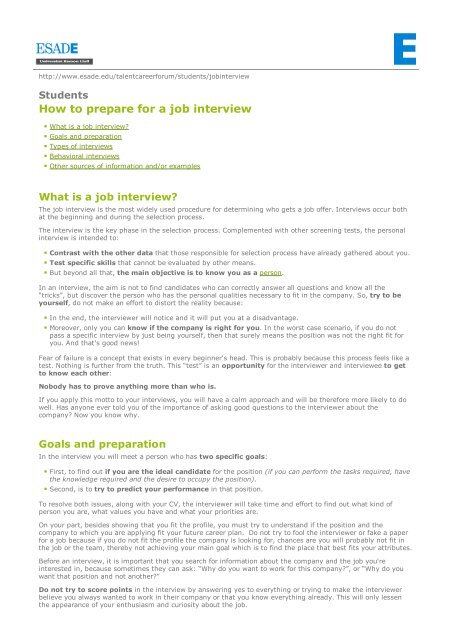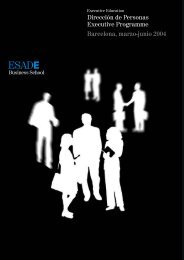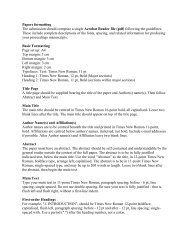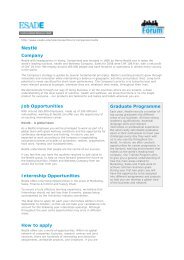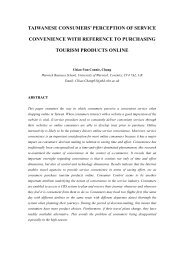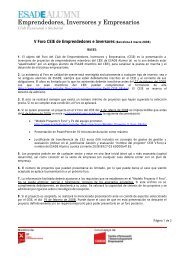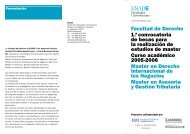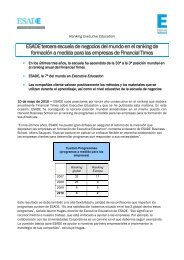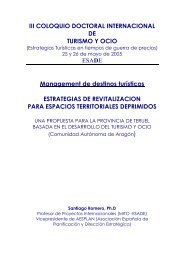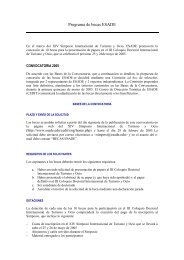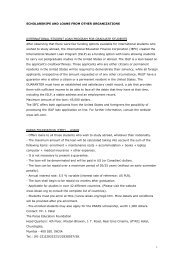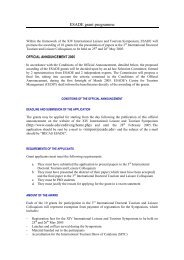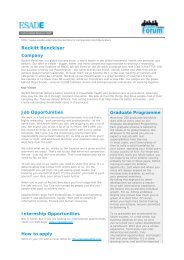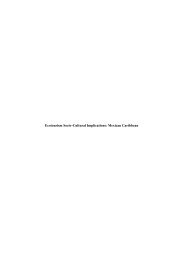Job Interview | BBA & MSc ESADE Career Forum
Job Interview | BBA & MSc ESADE Career Forum
Job Interview | BBA & MSc ESADE Career Forum
Create successful ePaper yourself
Turn your PDF publications into a flip-book with our unique Google optimized e-Paper software.
http://www.esade.edu/talentcareerforum/students/jobinterview<br />
Students<br />
How to prepare for a job interview<br />
What is a job interview?<br />
Goals and preparation<br />
Types of interviews<br />
Behavioral interviews<br />
Other sources of information and/or examples<br />
What is a job interview?<br />
The job interview is the most widely used procedure for determining who gets a job offer. <strong>Interview</strong>s occur both<br />
at the beginning and during the selection process.<br />
The interview is the key phase in the selection process. Complemented with other screening tests, the personal<br />
interview is intended to:<br />
Contrast with the other data that those responsible for selection process have already gathered about you.<br />
Test specific skills that cannot be evaluated by other means.<br />
But beyond all that, the main objective is to know you as a person.<br />
In an interview, the aim is not to find candidates who can correctly answer all questions and know all the<br />
“tricks”, but discover the person who has the personal qualities necessary to fit in the company. So, try to be<br />
yourself, do not make an effort to distort the reality because:<br />
In the end, the interviewer will notice and it will put you at a disadvantage.<br />
Moreover, only you can know if the company is right for you. In the worst case scenario, if you do not<br />
pass a specific interview by just being yourself, then that surely means the position was not the right fit for<br />
you. And that's good news!<br />
Fear of failure is a concept that exists in every beginner‘s head. This is probably because this process feels like a<br />
test. Nothing is further from the truth. This “test” is an opportunity for the interviewer and interviewee to get<br />
to know each other:<br />
Nobody has to prove anything more than who is.<br />
If you apply this motto to your interviews, you will have a calm approach and will be therefore more likely to do<br />
well. Has anyone ever told you of the importance of asking good questions to the interviewer about the<br />
company? Now you know why.<br />
Goals and preparation<br />
In the interview you will meet a person who has two specific goals:<br />
First, to find out if you are the ideal candidate for the position (if you can perform the tasks required, have<br />
the knowledge required and the desire to occupy the position).<br />
Second, is to try to predict your performance in that position.<br />
To resolve both issues, along with your CV, the interviewer will take time and effort to find out what kind of<br />
person you are, what values you have and what your priorities are.<br />
On your part, besides showing that you fit the profile, you must try to understand if the position and the<br />
company to which you are applying fit your future career plan. Do not try to fool the interviewer or fake a paper<br />
for a job because if you do not fit the profile the company is looking for, chances are you will probably not fit in<br />
the job or the team, thereby not achieving your main goal which is to find the place that best fits your attributes.<br />
Before an interview, it is important that you search for information about the company and the job you're<br />
interested in, because sometimes they can ask: “Why do you want to work for this company?”, or “Why do you<br />
want that position and not another?”<br />
Do not try to score points in the interview by answering yes to everything or trying to make the interviewer<br />
believe you always wanted to work in their company or that you know everything already. This will only lessen<br />
the appearance of your enthusiasm and curiosity about the job.
It is also advisable to practice a lot during this phase of the selection process so that you can beat your main<br />
enemies in the interview: the fears and uncertainties that could cause you make mistakes or get confused. In<br />
fact, many candidates first line up interviews with companies that are not in their list of priorities in order to<br />
practice and get the experience necessary for the interviews with their favorite companies.<br />
During the interview, it is essential that you listen carefully to the interviewer, especially when he/she is<br />
talking about the tasks to be carried out in case you join the company. If you do not understand something or<br />
you have any doubts about the job functions, feel free to ask the appropriate questions, preferably at the end of<br />
the interview. Always let the interviewer lead the conversation and do not make the mistake of talking more<br />
than necessary.<br />
In the interview, time is money.<br />
Do not lose it talking about unimportant issues that say little about you. It is better for you to organize yourself<br />
ahead of time in order to squeeze the possibilities of promoting yourself throughout the interview. The<br />
personal interview is the time where you can make the difference with the other candidates: do not limit<br />
yourself, but answer questions briefly.<br />
Take every opportunity to provide the information you want<br />
for them to know about you, but only if it has some<br />
connection to the question that they asked.<br />
The interviewer will direct the session to the areas where he/she is most interested, but you can do the same<br />
with your answers.<br />
It is important that before the interview you review your CV, think about your strengths and weaknesses to<br />
present your only your best for the company. When reviewing your past experiences reflected on your CV,<br />
remember that sometimes understanding why you did something has more significance than the act itself. They<br />
will ask you “why?” to almost everything and you must know to answer and support it with good arguments.<br />
Types of interviews<br />
The phone interview: It usually catches you off guard and many companies use it as another filter before<br />
the interview. Therefore, in the job search process you have to be prepared for any call, have enough<br />
information on the company and know what you want to say.<br />
The personal interview: Here the interviewer tries to create a nice environment that makes communication<br />
easier and allows him/her to know you and assess your suitability for the job. Its aim is to get as much<br />
information as possible about you, therefore, provide all you can, do not remain silent and try be natural!<br />
Remember that each interview is unique and is just about getting to know you.<br />
The technical interview: The purpose of this interview is to evaluate your technical knowledge on a<br />
particular issue, either your school or your possible future job in the company. This interview leaves little<br />
room for improvisation and is shorter than the last.<br />
The stress interview: It tries to see how well you do with more aggressive postures to try to understand<br />
how you would react in similar situations while working at the company. Therefore, the interviewer will play a<br />
role that will put you in a "complicated" situation. To succeed, it is best to show respect but still you must<br />
defend your place and not fall apart. As a curiosity, you could see the Spanish film “The Method” based on<br />
the play “The Gronhölm Method”, and directed by Marcelo Pineyro.<br />
The case method: This test will get you closer to the company's business reality. Through a real case you<br />
would have to engage in a process of analysis and discussion about how to make decisions, which are the<br />
most appropriate and why. It is intended to study the situation, identify problems, reach your own<br />
conclusions and defend your ideas.<br />
Brain teasers: The brain teasers are questions that seek to discover your analytical ability. Actually, it is not<br />
about giving the correct answer, which will often be impossible, but reasoning properly in order to reach<br />
conclusions that are more or less acceptable. There are many different types, from mental arithmetic to logic.<br />
Behavioral interview<br />
<strong>Interview</strong>s usually focus on behavior, and for this reason they are sometimes referred to as behavioral<br />
interviews. There are two basic approaches to asking behavioral questions:<br />
To ask the interviewee to describe specific instances of past behavior that reflects a competency that the<br />
employer is looking for in applicants. The assumption behind this approach is that past behavior is the best<br />
predictor of future behavior.<br />
To pose hypothetical situations that might arise on the job. The interviewee is then asked to describe what<br />
she/he would do. The assumption behind this approach is that behavior on the job can be predicted by an<br />
applicant’s intentions.<br />
Other sources of information and/or examples<br />
http://jobsearch.about.com/od/interviewquestionsanswers/a/interviewquest.htm
http://jobsearch.about.com/od/interviewquestionsanswers/<br />
http://www.jobinterviewquestions.org/<br />
http://www.best-interview-strategies.com/questions.html


